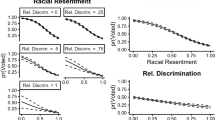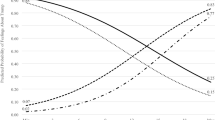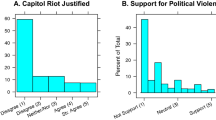Abstract
We argue that hostile sexism and racial resentment play an important and somewhat underappreciated role in American elections through their influence on voter turnout and engagement with political campaigns. The effects of these attitudes are not straightforward but depend on partisanship. We evaluate whether high levels of racial resentment and hostile sexism cross-pressure Democratic partisans, resulting in lower levels of political participation. We further consider whether high levels of racial resentment and hostile sexism bolster participation among Republicans. We find evidence of these divergent effects on the political mobilization of white voters using the 2016 American National Election Study. The results support our expectations and suggest that cuing resentment-based attitudes was an important strategy for engaging voters in the 2016 presidential campaign and will likely play an important role in future campaigns as well.





Similar content being viewed by others
Notes
Other research in this vein explores how the presence or absence of racialized candidates influences voter turnout. This work does not necessarily include direct measures of racial attitudes, but the implication is that racial attitudes underlie turnout disparities related to candidates’ racial characteristics (see for example Gay 2001; Medenica and Fowler 2020; Philpot, Shaw, and McGowen 2009). Research does not link the presence of women on the ballot to changes in voter turnout rates (Dolan 2006).
Pasek et al (2014) explore multiple measures of racial animus. They find an effect for symbolic racism and racial stereotypes, but not racial resentment.
Racial attitudes were likely linked to perceptions of Donald Trump from the very start of his campaign. Trump gained public attention and notoriety on a birther platform, by amplifying the conspiracy theory that the Barack Obama presidency was illegitimate because Obama was not born in the United States. Trump also employed explicitly racialized rhetoric during his presidential campaign, for instance, when describing immigrants from Mexico (Post 2015) and Muslims entering the U.S. (Johnson 2015).
A combination of candidate characteristics and campaign rhetoric likely made gender-based attitudes like sexism more salient to voters. Hillary Clinton was the first woman to win a major party nomination and run in a general election. Her campaign stressed gendered themes, including the campaign slogan “I’m with her,” and many analysts noted a marked feminine turn from her 2008 campaign strategy, which stressed more masculine themes (Kornblut 2011). In addition to Clinton’s own messaging, Donald Trump made a number of comments about his female opponents’ appearances that were widely interpreted as sexist (Keneally 2016).
Replication materials are available here: https://doi.org/10.7910/DVN/FXGD96.
We also ran models using the full seven-point self-placed ideological scale in place of ideological identity indicators. This made no substantive difference in the results we observed.
Some might view the political participation scale as a count variable, but we report results from an OLS model because the substantive results produced by OLS and a Poisson model are identical, and the former is easier to more directly interpret. Note that the unweighted mean and variance of the political participation variable are not appreciably different from one another at 1.39 and 1.51 respectively. Furthermore, when we ran the Poisson regression, a chi-square test indicates that the model does not suffer from overdispersion. This suggests that the Poisson model was appropriate for the data.
This means that the omitted category is Democratic identification.
The state competitiveness measure is not a part of the ANES, but it, too, was also generated before the day of the election.
We have no expectations for the effects of hostile sexism and racial resentment on the behavior of independents. These marginal effects are reported for the benefit of interested scholars but are otherwise not discussed.
In addition to this analysis, we evaluated whether the relationship between partisanship and hostile sexism and/or racial resentment varied depending on respondent gender. We did not find a meaningful pattern of difference between men and women for any of the participation items. This result is consistent with existing research suggesting that Americans are more divided by their beliefs about gender than by their own gender identification (e.g., Deckman and Cassese, 2019; Sides et al. 2020).
Interested readers can see the unweighted proportion of respondents who reported engaging in these activities in the table of summary statistics included in the supplemental appendix.
References
Algara, C., & Hale, I. (2019). The Distorting Effects of Racial Animus on Proximity Voting in the 2016 Elections. Electoral Studies, 58, 58–69.
Ayala, L. J. (2000). Trained for Democracy: The Differing Effects of Voluntary and Involuntary Organizations on Political Participation. Political Research Quarterly, 53(1), 99–115.
Banks, A. J. (2014). Anger and Racial Politics: The Emotional Foundation of Racial Attitudes in America. Cambridge University Press.
Bracic, A., Israel-Trummel, M., & Shortle, A. F. (2019). Is Sexism for White People? Gender Stereotypes, Race, and the 2016 Presidential Election. Political Behavior, 41(2), 281–307.
Bump, P. (2018). 4.4 Million 2012 Obama Voters Stayed Home in 2016. [Online] Accessed September 30, 2020.
Carmines, E. G., & Stimson, J. A. (1989). Issue Evolution: Race and the Transformation of American Politics. Princeton University Press.
Cassese, E. C., & Barnes, T. D. (2019). Reconciling Sexism and Women’s Support for Republican Candidates: A Look at Gender, Class, and Whiteness in the 2012 and 2016 Presidential Races. Political Behavior, 41(3), 677–700.
Cassese, E. C., & Holman, M. R. (2019). Playing the Woman Card: Ambivalent Sexism in the 2016 US Presidential Race. Political Psychology, 40(1), 55–74.
Conroy, M. (2016). Masculinity, Media, and the American Presidency. Springer.
Davis, N. T., & Mason, L. (2016). Sorting and the Split-Ticket: Evidence from Presidential and Sub-Presidential Elections. Political Behavior, 38(2), 337–354.
Deckman, M., & Cassese, E. (2019). Gendered Nationalism and the 2016 U.S. Presidential Election: How Party, Class, and Beliefs about Masculinity Shaped Voting Behavior. Politics & Gender, 1–24.
Dolan, K. (2006). Symbolic Mobilization? The Impact of Candidate Sex in American Elections. American Politics Research, 34(6), 687–704.
Enten, H. (2017). Registered Voters Who Stayed Home Probably Cost Clinton The Election. [Online]. Accessed September 30, 2020.
Frasure-Yokley, L. (2018). Choosing the Velvet Glove: Women Voters, Ambivalent Sexism, and Vote Choice in 2016. Journal of Race, Ethnicity and Politics, 3(1), 3–25.
Gay, C. (2001). The Effect of Black Congressional Representation on Political Participation. American Political Science Review, 95(3), 589–602.
Gillion, D. Q., Ladd, J. M., & Meredith, M. (2020). Party Polarization, Ideological Sorting and the Emergence of the U.S. Partisan Gender Gap. British Journal of Political Science, 50(4), 1217–1243.
Glick, P., & Fiske, S. T. (1997). Hostile and Benevolent Sexism: Measuring Ambivalent Sexist Attitudes toward Women. Psychology of Women Quarterly, 21(1), 119–135.
Johnson, J. (2015). Trump calls for a ‘total and complete shutdown of Muslims entering the US. Washington Post. [Online], Accessed December 13, 2019.
Kam, C. D., & Burge, C. D. (2018). Uncovering Reactions to the Racial Resentment Scale Across the Racial Divide. The Journal of Politics, 80(1), 314–320.
Kam, C. D., & Kinder, D. R. (2012). Ethnocentrism as a short-term force in the 2008 American presidential election. American Journal of Political Science, 56(2), 326–340.
Kaufmann, K. M., & Petrocik, J. R. (1999). The Changing Politics of American Men: Understanding the Sources of the Gender Gap. American Journal of Political Science, 43(3), 864–887.
Keith, B. E., Magleby, D. B., Nelson, C. J., Orr, E. A., Westlye, M. C., and Raymond E. Wolfinger, R. E. (1992). The Myth of the Independent Voter. University of California Press.
Keneally, M. 2016. Donald Trump Offends Some With Comment That Clinton Lacks ‘Presidential Look’. ABC News. [Online] Accessed December 4, 2019.
Kinder, D. R., & Sanders, L. M. (1996). Divided by Color: Racial Politics and Democratic Ideals. University of Chicago Press.
Klar, S., & Krupnikov, Y. (2016). Independent Politics. Cambridge University Press.
Kornblut, A. E. (2011). Notes from the Cracked Ceiling: What it Will Take for a Woman to Win. Broadway Books.
Lavine, H. G., Johnston, C. D., & Steenbergen, M. R. (2012). The Ambivalent Partisan: How Critical Loyalty Promotes Democracy. Oxford University Press.
Levendusky, M. (2009). The Partisan Sort: How Liberals became Democrats and Conservatives became Republicans. University of Chicago Press.
Luks, S. and Schaffner, B. (2019). New Polling Shows how much Sexism is Hurting the Democratic Women Running for President. [Online]. Accessed September 30, 2020.
Luttig, M. D. (2017). Obama, Race, and the Republican Landslide in 2010. Politics, Groups, and Identities, 5(2), 197–219.
Mason, L. (2018). Uncivil Agreement: How Politics became Our Identity. University of Chicago Press.
McThomas, M., & Tesler, M. (2016). The Growing Influence of Gender Attitudes on Public Support for Hillary Clinton, 2008–2012. Politics & Gender, 12(1), 28–49.
Medenica, V. E., & Fowler, M. (2020). The Intersectional Effects of Diverse Elections on Validated Turnout in the 2018 Midterm Elections. Political Research Quarterly [Firstview].
Mendelberg, T. (2001). The Race Card: Campaign Strategy, Implicit Messages, and the Norm of Equality. Princeton University Press.
Mutz, D. C. (2018). Status Threat, Not Economic Hardship, Explains the 2016 Presidential Vote. Proceedings of the National Academy of Sciences, 115(19), E4330–E4339.
Newman, B., Merolla, J.L., Shah, S., Lemi, D., Collingwood, L., and Ramakrishnan, S.K. (2020). The Trump Effect: An Experimental Investigation of the Emboldening Effect of Racially Inflammatory Elite Communication. British Journal of Political Science. [Firstview].
Ondercin, H. L. (2017). Who is Responsible for the Gender Gap? The Dynamics of Men’s and Women’s Democratic Macropartisanship, 1950–2012. Political Research Quarterly, 70(4), 749–761.
Pasek, J., Stark, T. H., Krosnick, J. A., Tompson, T., & Keith Payne, B. (2014). Attitudes toward Blacks in the Obama Era: Changing Distributions and Impacts on Job Approval and Electoral Choice, 2008–2012. Public Opinion Quarterly, 78(1), 276–302.
Pasek, J., Tahk, A., Lelkes, Y., Krosnick, J. A., Payne, B. K., Akhtar, O., & Tompson, T. (2009). Determinants of Turnout and Candidate Choice in the 2008 U.S. Presidential Election Illuminating the Impact of Racial Prejudice and Other Considerations. Public Opinion Quarterly, 73(5), 943–994.
Petrocik, J. R. (2009). Measuring Party Support: Leaners are Not Independents. Electoral Studies, 28(4), 562–572.
Philpot, T. S., Shaw, D. R., & McGowen, E. B. (2009). Winning the Race: Black Voter Turnout in the 2008 Presidential Election. Public Opinion Quarterly, 73(5), 995–1022.
Piston, S. (2010). How Explicit Racial Prejudice Hurt Obama in the 2008 Election. Political Behavior, 32(4), 431–451.
Post, (Staff). (2015). Full Text: Donald Trump Announces Presidential Bid. Washington Post. [Online]. Accessed December 13, 2019.
Reny, T. T., Collingwood, L., & Valenzuela, A. A. (2019). Vote Switching in the 2016 Election: How Racial and Immigration Attitudes, not Economics, Explain Shifts in White Voting. Public Opinion Quarterly, 83(1), 91–113.
Sanbonmatsu, K. (2002). Gender Stereotypes and Vote Choice. American Journal of Political Science, 20–34.
Schaffner, B.F. (2019). Follow the Racist: The Consequences of Trump’s Expressions of Prejudice for Mass Rhetoric. Working Paper.
Schaffner, B.F. (2020). How Political Scientists Should Measure Sexist Attitudes. Working Paper.
Schaffner, B. F., MacWilliams, M., & Nteta, T. (2018). Understanding White Polarization in the 2016 Vote for President: The Sobering Role of Racism and Sexism. Political Science Quarterly, 133(1), 9–34.
Sidanius, J. (1993). The Interface between Racism and Sexism. The Journal of Psychology, 127(3), 311–322.
Sides, J., Tesler, M., & Vavreck, L. (2018a). Identity Crisis: The 2016 Presidential Campaign and the Battle for the Meaning of America. Princeton University Press.
Sides, J., Tesler, M., & Vavreck, L., (2018b). Hunting where the ducks are: activating support for Donald Trump in the 2016 Republican primary. Journal of Elections, Public Opinion and Parties, 28(2), 135–156.
Sides, J., Tesler, M., & Vavreck, L. (2020). Gender Attitudes and American Public Opinion in the Trump Era. in Dynamics of American Democracy: Partisan Polarization, Political Competition, and Government Performance, Eric Patashnik and Wendy Schiller (eds.), University of Kansas Press.
Sniderman, P. M., & Stiglitz, E. H. (2008). Race and the Moral Character of the Modern American Experience. The Forum, 6(4), 1–15.
Swim, J. K., Aikin, K. J., Hall, W. S., & Hunter, B. A. (1995). Sexism and Racism: Old-Fashioned and Modern Prejudices. Journal of Personality and Social Psychology, 68(2), 199–214.
Tesler, M. (2015). The Conditions Ripe for Racial Spillover Effects. Political Psychology, 36, 101–117.
Tesler, M. (2016). Post-Racial or Most-Racial?: Race and Politics in the Obama Era. University of Chicago Press.
Tolbert, C. J., Redlawsk, D. P., & Gracey, K. J. (2018). Racial Attitudes and Emotional Responses to the 2016 Republican Candidates. Journal of Elections, Public Opinion and Parties, 28(2), 245–262.
Utych, S. M. (2020). Sexism Predicts Favorability of Women in the 2020 Democratic Primary and Men? Electoral Studies, [Firstview].
Valentino, N. A., Neuner, F. G., & Vandenbroek, L. M. (2018a). The Changing Norms of Racial Political Rhetoric and the End of Racial Priming. The Journal of Politics, 80(3), 757–771.
Valentino, N. A., & Sears, D. O. (2005). Old Times There Are Not Forgotten: Race and Partisan Realignment in the Contemporary South. American Journal of Political Science, 49(3), 672–688.
Valentino, N. A., Wayne, C., & Oceno, M. (2018b). Mobilizing Sexism: The Interaction of Emotion and Gender Attitudes in the 2016 US Presidential Election”. Public Opinion Quarterly, 82(1), 799–821.
Verba, S., Schlozman, K. S., & Brady, H. E. (1995). Voice and Equality: Civic Voluntarism in American Politics. Harvard University Press.
Weisberg, H. F. (2015). The Decline in the White Vote for Barack Obama in 2012: Racial Attitudes or the Economy? Electoral Studies, 40, 449–459.
Whitehead, A. L., & Perry, S. L. (2019). Is a ‘Christian America’ a More Patriarchal America? Religion, Politics, and Traditionalist Gender Ideology”. The Canadian Review of Sociology, 56(2), 151–177.
Windett, J. H., Banda, K. K., & Carsey, T. M. (2013). Racial Stereotypes, Racial Context, and the 2008 Presidential Election. Politics, Groups, and Identities, 1(3), 349–369.
Wolbrecht, C. (2000). The Politics of Women’s Rights: Parties, Positions, and Change. Princeton University Press.
Wolfsfeld, G., Yarchi, M., & Samuel-Azran, T. (2016). Political Information Repertoires and Political Participation. New Media & Society, 18(9), 2096–2115.
Acknowledgements
We would like to thank the attendees of the University of Wisconsin-Madison’s American Politics Workshop, the anonymous reviewers, and the editors for their helpful feedback on earlier drafts of this project. We also thank Nicholas Winter for modifying the combomarginsplot Stata package to allow us to better present our results.
Author information
Authors and Affiliations
Corresponding author
Additional information
Publisher's Note
Springer Nature remains neutral with regard to jurisdictional claims in published maps and institutional affiliations.
Supplementary Information
Below is the link to the electronic supplementary material.
Rights and permissions
About this article
Cite this article
Banda, K.K., Cassese, E.C. Hostile Sexism, Racial Resentment, and Political Mobilization. Polit Behav 44, 1317–1335 (2022). https://doi.org/10.1007/s11109-020-09674-7
Accepted:
Published:
Issue Date:
DOI: https://doi.org/10.1007/s11109-020-09674-7




